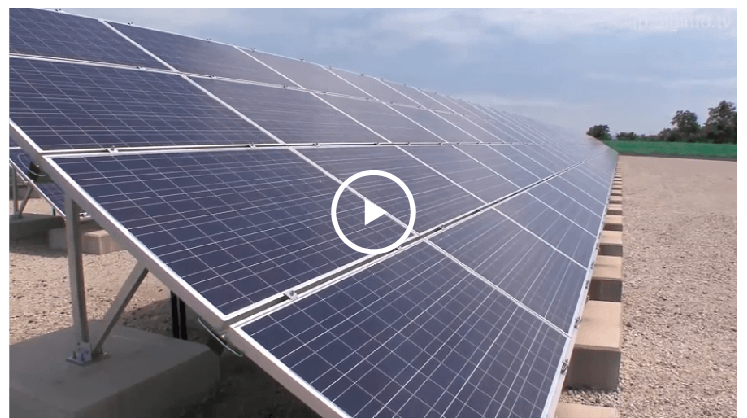- Biomass Power Generation
(Wood and Other Dried Materials) - Organic Biomass Operations
- Business Scheme for
Wood Biomass Power Generation - Selection in Plant Design
- Application of “AI” technology
in Biomass by PR-AZ - Sites of Implementation of Full Range of Biomass Operations (Including Ones in Planning Stage) and Material Procurement
Vitalizing the regional economy and production activities by regional energy industry
Our wood and dried biomass power generation are structured by combining unused biomass resources produced
by local manufacturing and the like with the latest technologies and methods, thereby achieving economically
rational power generation and heat utilization. With agriculture, forestry, and fishery industries, foodstuff-related
industries, and unused local biomass, we can achieve biomass power generation of 2 MW or less by appropriately
addressing the issues related to use of each of these sources.
Business Scheme for Wood Biomass Power Generation
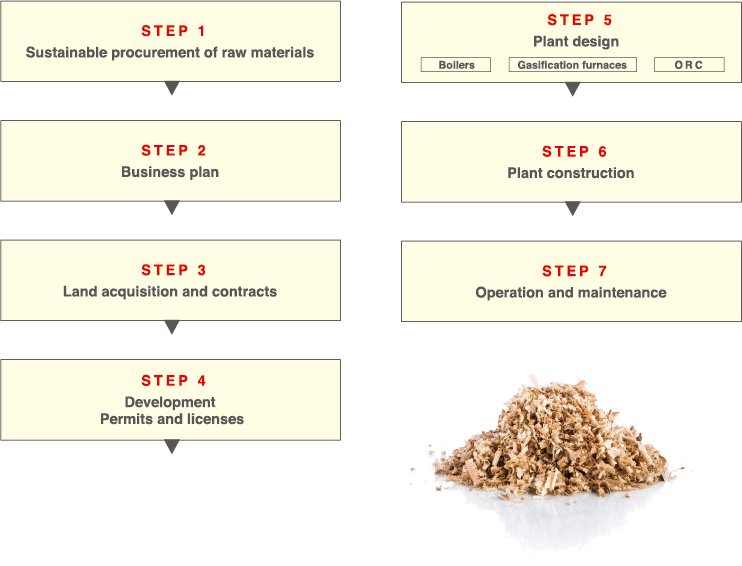
Selection in Plant Design
Boilers
Whereas fossil-fuel boilers use such fuels as fuel oil A(Jis), kerosene, or LP gas, biomass boilers use wood and dried biomass. The boiler burns the biomass, producing steam and
hot water as drive force and a source of energy. Shifting from conventional fossil fuels to biomass energy makes possible vast reductions of CO2 emission.
As Fossil-fuel prices are also subject to steep increases, employing our expertise to make use of unused biomass from
the local area and industrial fields is relatively effective in terms of costs as well.
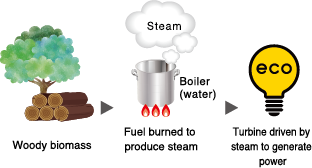
Gasification Furnaces
Chipped or pelletized woody biomass is heated in a gasification furnace in a low-oxygen state, breaking it down into carbon and gas by means of pyrolysis and reduction reactions. The system generates power using engines fueled by this gas.
– High power-generation efficiency even at a small scale
– A system eliminating tar, which is a major factor impeding power generation, thereby achieving stable usage of diverse woody materials
– Simple equipment and small installation footprint.
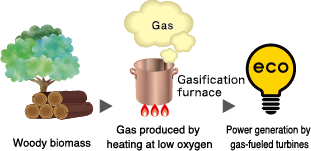
Organic Rankine Cycle (ORC)
This uses the same power-generation system as steam turbines, but the thermal medium is not water (steam), but instead a medium that has a low boiling point (such as silicone oil). This is evaporated at a temperature lower than that of boiling water, driving a turbine to generate power. As cogeneration supplying both heat and electricity, it makes possible use of both hot water and low-pressure steam.
– High power-generation efficiency even at a small scale
– Low usage pressure of the thermal medium, ensuring safety
– Low mechanical stress and no turbine corrosion, reducing the maintenance burden
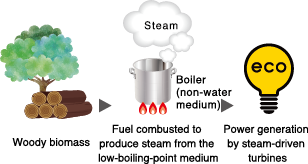
Application of “AI” technology in Biomass by PR-AZ
A factor that impedes suitable use of local-region biomass is the inability to
achieve accurate assessment and control of type, quality, and quantity. At PR-AZ,
we regard such activities as biomass power generation, heat utilization, and fuel
production as operations of “producing energy resources of stable quality from a
broad range of variable materials.”
In this production of energy resources, we make use of the technologies of Artificial
Intelligence (AI) and the Internet of Things (IoT) from material procurement through
to manufacturing and fluctuations that include the type, quality, and quantity of the
material as well as weather, thereby stabilizing production control, logistics control,
and other tasks. We have begun actual industrial implementation, achieving major benefits.
Sites of Implementation of Full Range of Biomass Operations
(Including Ones in Planning Stage)
and Material Procurement
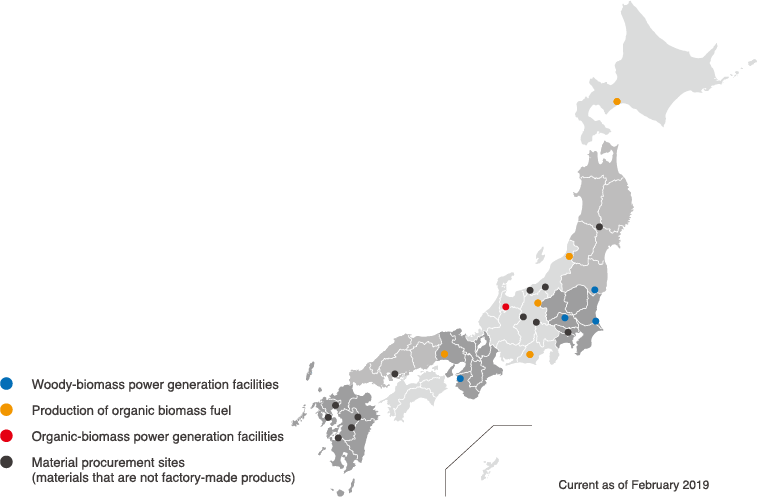
Organic biomass operations are energy operations of the future that will revolutionize the Industrial configuration
PR-AZ aims to create a recycling-oriented business model with links to industrial structure. Sources of energy
from materials created in local regions are used, and these energy sources are supplied to the local regions.
We believe organic biomass operations to be an optimal tool for this recycling-oriented business model
based on local production for local consumption. We are actively pursuing organic biomass operations.
Issues
Issues in Biomass Power Generation
– Uneven balance between the expanding market scale of biomass power generation and the supply of raw materials
(chiefly wood chips and palm-kernel shells [PKS])
– High susceptibility of biomass fuel to market fluctuations
(balance of supply and demand, material market prices, material types)
– Unstable material quality
– Difficulty in power generation due to difficulty in ensuring stable long-term supply of materials
Issues in Industry Structure
– Increased waste treatment due to diversification and expansion of lifestyle models and diversification of
food consumption
– Compliance with increasingly stricter recycling laws
– Worldwide environmental protection growing every more difficult day by day
– Living environment
Efforts by PR-AZ
? Solutions to meet the challenges of industrial issues
We take waste materials emitted by various industries and
transform them into high-quality biomass fuel which is distributed
into the economy.
? Adaptation to widely diversifying operation models
We offer optimal solutions to accommodate a diverse array of
needs, from power generation to business operations for supply as
biomass fuel, boosting efficiency in manufacturing plants and
in agricultural and fisher-related operations, and even overall
coordination of business operations.
? Secure, safe, and stable supply models
The raw materials are procured from a various range of industries
in Japan, making possible accurate traceability as well as enabling
the stable supply of secure and safe raw materials that are resistant
to the impact of overseas market conditions.
? Creation of a supply network covering all regions
of Japan
From Hokkaido in the north to Kyushu and Okinawa in the south,
we are moving ahead with the construction of production centers
for biomass fuel in all areas of Japan. We are configuring a supply
network that meets the needs of biomass power-generation facilities
dispersed throughout the country and operators that use biomass fuel.
? Feed-in Tariffs (FIT)
The price assurance of the feed-in tariffs (FIT) established by
Japan’s Ministry of Economy, Trade, and Industry enables optimal
utilization in business operations that use FIT.
? Creation of new business models through research
and development
With respect to the modality of business models in the area
of biomass operations, we conduct research and development
in collaboration with specialized entities, centering on universities,
and collect data for creating new business models.
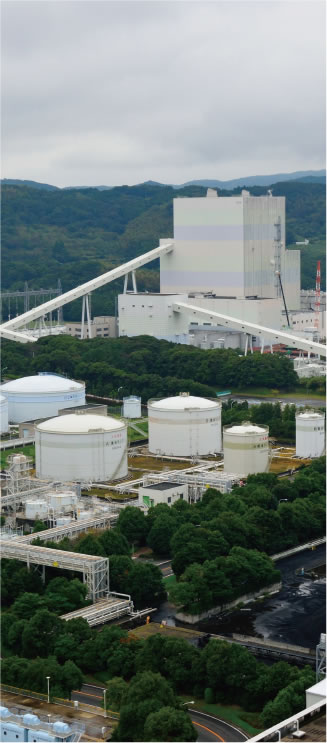
Scheme of Biomass Operations
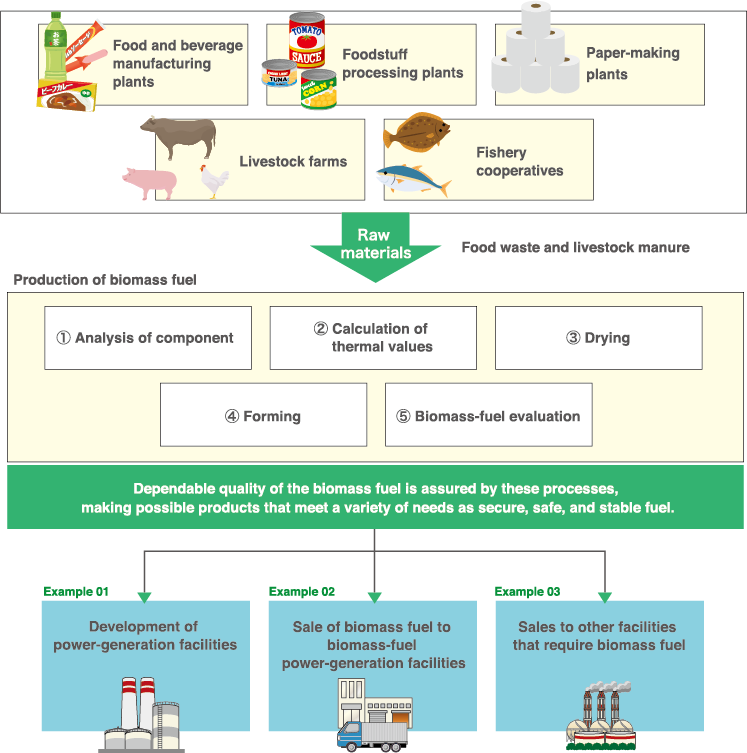
The needs for biomass fuel are diverse.
PR-AZ can offer solutions that meet your needs.

